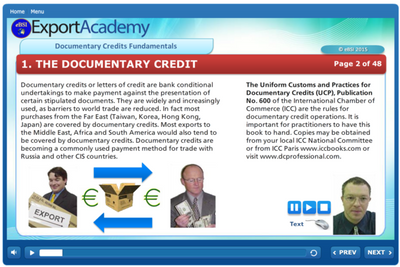DOCUMENTARY CREDITS: On the Basis of the Documents Alone

Definition of “Complying Presentation”
Article 2 of the UCP 600 ICC rules, which govern documentary credit operations, states that a “complying presentation means a presentation that is in accordance with the terms and conditions of the credit, the applicable provisions of these rules and international standard banking practice.” Therefore, the documents presented under a documentary credit must be prepared in compliance with the credit’s conditions, the provisions of UCP 600, and the international standard banking practice, following the relevant hierarchy.
Criteria for Document Examination
But what criteria should be used for the examination of documents? The answer can be found in a reading of Article 14 of UCP 600, “Standard for Examination of Documents.” In particular, paragraph (a) reads as follows:
“A nominated bank acting on its nomination, a confirming bank, if any, and the issuing bank must examine a presentation to determine, on the basis of the documents alone, whether or not the documents appear on their face to constitute a complying presentation.”
(Note: To fully understand this article, it is advisable to read it in conjunction with Articles 4 (Credits vs. Contracts), 5 (Documents vs. Goods, Services or Performance) and 34 (Disclaimer on Effectiveness of Documents) of UCP 600.)
“On the Basis of the Documents Alone”
It can therefore be stated that the evaluation of the documents “on the basis of the documents alone” is a fundamental principle of documentary credit operations. Banks are required to examine the documents solely to determine whether, prima facie, they comply with the terms of the credit, UCP 600, and international standard banking practice, without having to assess their “actual” conformity. Essentially, the “four-corner rule” applies, meaning that what is indicated within the four corners of the document prevails.
Banks charged with examining the documents are not required to make assessments beyond the documents presented to determine factual or legal issues regarding the data contained therein. Their obligation is limited to examining the documents diligently and with “professional care” to ascertain whether they are (or are not) “complying” as specified by UCP 600.
“Appear on Their Face”
In addition, banks tasked with examining the documents must determine whether the presentation “appears on its face” to be in order. The term “on its face” is not intended to imply an examination limited to the first page versus the back of a document; rather, it emphasizes that the presentation must be examined in accordance with the rationale underlying the rules. If the documents are examined according to the prescribed criteria, banks cannot be held responsible if it later turns out that a document was fraudulent, forged or issued without proper authority.
Given the foregoing, it is advisable for practitioners to clearly define in the credit the characteristics (in terms of the issuing party, content, required indications, etc.) of any document to be requested or presented. For example, the request for a “pre-shipment inspection certificate,” even when accompanied by the indication “issued by an independent inspection company,” might not be sufficient to ensure that the beneficiary of a credit has properly performed the required service. Banks examining the document would be obliged, in line with the discussion above, to honor their commitments even if the document reflects a negative inspection. Banks should only evaluate whether the content of the presented document “appears – on the basis of the documents alone and on its face – to fulfill the function of the document and is not in conflict with the data stated in the credit or in other required documents” (cf. Article 14, UCP 600), making the actual inspection result of the goods irrelevant for the purpose of determining conformity.
The “Fraud Exception”
It is important to note that the principles of credit independence from the underlying contract—referenced in Articles 4 (Credits vs. Contracts), 5 (Documents vs. Goods, Services or Performance), 14 (Standard for Examination of Documents) and 34 (Disclaimer on Effectiveness of Documents) of UCP 600—are limited by the so-called “fraud exception.” Buyers, to the extent that they can prove that the seller is not entitled to payment due to fraud, may attempt to prevent a bank from honoring its obligations if they believe that they have received goods not in conformity with the agreement or that the seller has contractually defaulted. The resolution of issues related to the “fraud exception” is not covered by UCP 600 but rather by local law. In Italy, for example, the fraud or dolo (deceit) exception can be invoked only when there is clear, indisputable evidence—evidence that must be liquid, objective, and documented. Consequently, a customer/debtor may only attempt to prevent payment by the bank if they obtain an urgent order from the competent judicial authority pursuant to Article 700 of the Italian Code of Civil Procedure.
Sub-Articles 12b and 7c of UCP 600
For completeness, it is appropriate to note that UCP 600 protects the designated banks that correctly honor or negotiate (prepay) a credit. Article 7c states:
“An issuing bank undertakes to reimburse a nominated bank that has honoured or negotiated a complying presentation and forwarded the documents to the issuing bank. Reimbursement for the amount of a complying presentation under a credit available by acceptance or deferred payment is due at maturity, whether or not the nominated bank prepaid or purchased before maturity. An issuing bank’s undertaking to reimburse a nominated bank is independent of the issuing bank’s undertaking to the beneficiary.”
This provision is related to Article 12b of UCP 600, which states:
“By nominating a bank to accept a draft or incur a deferred payment undertaking, an issuing bank authorizes that nominated bank to prepay or purchase a draft accepted or a deferred payment undertaking incurred by that nominated bank.”
Thus, any prepayments made by the nominated bank—“acting on its nomination”—are, by default, authorized by the issuing bank. This is intended to safeguard the relationship between the two banks in the event that the issuing bank is subject to a local judicial order (initiated by the applicant) not to make reimbursement at maturity when there is a valid reason under local law—discovered only after the nominated bank’s advance (e.g., fraud on the goods)—to prevent debiting the applicant and reimbursing the nominated bank. Essentially, this provision protects the nominated bank—which has correctly performed its obligations to the beneficiary according to the rules—from a potential injunction against the issuing bank by the local judiciary, confirming that any prepayments were made not on its own initiative but under the express and implied mandate of the issuing bank.
Conclusions
In summary, it is evident that given the peculiar nature and regulation of financial instruments (documentary credits and international bank guarantees) used in international trade, the solutions for minimizing risks in international sales must necessarily be identified within the instrument itself rather than through substantive indications. The introduction of the provisions in Articles 7 and 12 of UCP 600—regarded as a significant innovation compared to UCP 500—strengthens, in the writer’s view, the principle of credit independence from the underlying contract and, in particular, the principle of examining documents “on the basis of the documents alone.”
D. Del Sorbo
Translated and adapted from the Italian Original Version at:
https://www.studiodelsorbo.it/crediti-documentari-on-the-basis-of-the-documents-alone/
| Course Units Referenced in this Article: Letter of Credit Essentials Letters of Credit Advanced Bonds & Guarantees International Contracts Trade Finance Fraud Prevention |
Programs Referenced in this Article:
|






